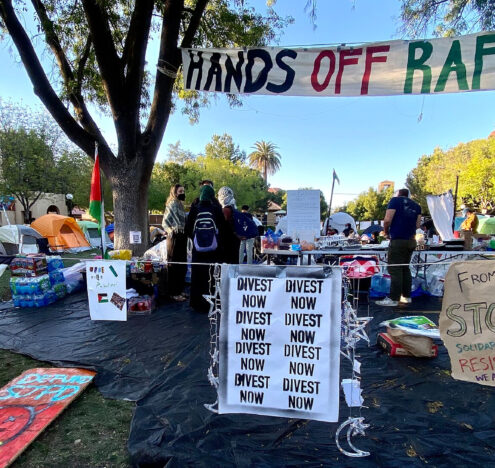On Friday, Oct. 13, 2023, in the wake of Hamas’ massacre of over 1,300 Israelis and Israel’s subsequent order to evacuate a million Palestinian civilians out of northern Gaza, a group of 18 lawmakers wrote to President Joe Biden and Secretary of State Antony Blinken. They expressed concern about the devastating humanitarian consequences to come and urged “those carrying out military operations to follow international humanitarian law and protect innocent civilian lives on both sides.” Amidst other requests, namely to work quickly to restore the delivery of food, water, fuel, electricity, and other necessities to Gaza, the lawmakers’ first request to Biden and Blinken was to “communicate that Israel’s response in Gaza must be carried out according to international law and take all due measures to limit harm to innocent civilians.”
All states are bound by the body of laws known as international humanitarian law or the “laws of armed conflict,” codified in the 1949 Geneva Conventions, its two 1977 Additional Protocols, the Hague Conventions of 1899 and 1907, and certain weapons conventions. Created to protect civilians in armed conflict, international humanitarian law is concerned with jus in bello, or the “how” of the conduct of hostilities. It is independent from questions about the “why” of war: the justification or reasons for war, or jus ad bellum. No matter the justness of cause for any given war, per the law of armed conflict, all belligerents’ hostilities must adhere to principles that protect innocent civilians.
As human rights groups have rightly pointed out, the taking of hostages, murder, and torture of civilians by Hamas last weekend constitute clear-cut, unambiguous, and undeniably grave war crimes. But international humanitarian law applies equally to both sides of a conflict: war crimes committed by one side do not excuse war crimes committed in response. Turning then to the lawmakers’ letter to Biden regarding Israel’s ongoing response, do Israel’s most recent actions in Gaza violate international humanitarian law?
Israel’s Disregard for International Humanitarian Law
The two central principles of the law of armed conflict are the distinction between civilians and combatants and the proportionality of force necessary to achieve objectives while minimizing casualties. International legal experts and human rights organizations have voiced that Israel’s siege of Gaza violates both these principles.
Israel has not only failed to adhere to the principle of distinction, but government officials have falsely claimed distinction is no longer necessary. Israeli President Isaac Herzog stated on Friday, Oct. 13, 2023, that “it is an entire nation out there that is responsible. It is not true, this rhetoric about civilians not being aware, not involved.” This sweeping characterization of Palestinian civilians in Gaza, almost half of whom are children under 18, as perpetrators of the massacre conducted by Hamas last weekend shows a chilling refusal to distinguish between combatants and civilians.
International humanitarian law applies equally to both sides of a conflict: war crimes committed by one side do not excuse war crimes committed in response. Turning then to the lawmakers’ letter to Biden regarding Israel’s ongoing response, do Israel’s most recent actions in Gaza violate international humanitarian law?
Second, the Israeli government has not maintained the principle of proportionality in its response. International law demands that even in the course of pursuing legitimate military goals and even when the enemy party has targeted civilians, the conduct of warfare must be governed by a proportionate response. The failure to distinguish and maintain proportionality is most evident in the starvation of civilians. As Tom Dannenbaum points out, the starvation of civilians as warfare violates international humanitarian law and constitutes a war crime under Article 8 of the International Criminal Court (ICC)’s Rome Statute, which states that it is a war crime to “intentionally us[e] starvation of civilians as a method of warfare by depriving them of objects indispensable to their survival, including wilfully impeding relief supplies as provided for under the Geneva Conventions.”
On Monday, Oct. 9, 2023, Minister of Defense Yoav Gallant declared a “complete siege of the Gaza Strip,” announcing that there “will be no electricity, no food, no fuel…we are fighting human animals and we are acting accordingly.” Israel has cut off all electricity, food, and water in Gaza, which now cannot power hospitals, including life-saving equipment, or morgues to treat the civilian victims of indiscriminate airstrikes. Though Israel reportedly resumed water supply on Sunday, Oct. 15, 2023, to southern Gaza after White House pressure, accounts on the ground on Monday, Oct. 16, state that with water pipes destroyed and no electricity, Gazans remain without access to clean water, resorting to drinking dirty water, risking the spread of disease. While Israel does not recognize the ICC, Palestine is a party to the Rome Statute. Thus, the ICC has jurisdiction over the occupied Palestinian territories, including the Gaza Strip, to investigate both Hamas’ attack and the Israeli response. Gallant’s remarks, then, could one day serve as evidence submitted to the court for intent to commit war crimes.
The disproportionate harm to civilians from the bombardment of Gaza violates the principles of proportionality and distinction, even when strikes have targets with a legitimate military objective. So far this past week, the bombings in Palestine have killed at least 2,750 people, including at least 724 children, and 9,700 others wounded (these numbers will most likely increase after this article is published). Kenneth Roth, the former head of Human Rights Watch, responded to photos published on Thursday, Oct. 12, 2023, by the Israeli Air Force: “This is supposed to be attacking only military targets and not exacting revenge against Gaza’s civilian population? Apparently to show that it is striking back hard, the Israeli military itself is publishing evidence of possible war crimes.”
Third, international legal experts have called October 13’s order for over one million Palestinians in north Gaza to leave their homes a war crime of forcible transfer, made more severe because Israel has not yet facilitated humanitarian access to Gaza. Jan Egeland, the secretary general of the Norwegian Refugee Council, implored “the United States, the UK, the European Union, and other Western and Arab Nations who have influence over the Israeli political and military leadership” to “demand that the illegal and impossible order to relocate is immediately rescinded.” The most prominent international organizations have followed suit. Urging Israel to reverse its evacuation order, the UN stated that the order could not be conducted “without devastating humanitarian consequences” and could “transform what is already a tragedy into a calamitous situation.”
The International Committee of the Red Cross issued a rare public statement, saying, “Nothing can justify the horrific attacks Israel suffered last weekend…but those attacks cannot in turn justify the limitless destruction of Gaza.” They continued, “When military powers order people to leave their homes, all possible measures must be taken to ensure the population has access to basic necessities like food and water and that members of the same family are not separated.”
In fact, firsthand accounts attest that airstrikes targeted Palestinians in buses and ambulances as they fled south. Prior to Israel’s order, over 400,000 Palestinians had already been displaced, and many feared that the evacuation order was the start of a second Nakba. The UN Agency for Palestinian Refugees reported on Oct. 14, 2023, that in one week alone, nearly one million people were displaced in Gaza.
Sven Kühn von Burgsdorff, former EU ambassador to the Occupied Palestinian Territories, stated:
“Distinction, proportionality, and precaution are sacrosanct principles for the code of conduct of armed hostilities. And Israel, as a democracy, cannot escape that and has to be held accountable. It cannot be that Israel has a carte blanche because terrible acts, brutal, gruesome acts happened to 1,000 or even 1,200 Israelis. That is not the excuse you can use to flatten Gaza.”
Finally, Amnesty International and Human Rights Watch have documented the use of white phosphorus by Israeli armed forces in densely populated civilian areas of Gaza. Documenters found several photos of artillery shells bearing US Department of Defense identification codes for white phosphorus-based rounds. While the use of white phosphorus is not outright banned under international law and can be used lawfully for marking, signaling, and against military targets in open spaces, the use of white phosphorus over populated areas places civilians at significant risk of severe burns and long-term injuries and may violate the principles of distinction and proportionality. Human Rights Watch’s Lama Fakih explained that the use of white phosphorus as a weapon is considered “unlawfully indiscriminate when airburst in populated urban areas, where it can burn down houses and cause egregious harm to civilians.”
The US’ Failure to Hold Its Ally to Account
On Thursday, Oct. 12, 2023, in Tel Aviv, Blinken told Israel’s President Benjamin Netanyahu, “You may be strong enough on your own to defend yourself. But as long as America exists, you will never ever have to. We will always be there by your side.” Secretary of Defense General Lloyd J. Austin III has stated that the United States has placed no conditions on arms transfers. When asked about the civilian casualties in Gaza and any “assurances” from Israel about how they’ll use these munitions, Austin stated, “This is a professional force that’s well-led, so…I’m sure they’ll do the right thing.”
US officials should immediately respond to the growing evidence that the key tenets of laws of war are already being violated in Israel’s response to Hamas’ brutal attacks. Yesterday, several lawmakers, backed by humanitarian groups, introduced a resolution urging the Biden administration to facilitate deescalation and cease-fire and to send and facilitate the entry of humanitarian assistance into Gaza.
As of yesterday, Oct. 16, 2023, humanitarian aid, including food, water, and fuel, remains stuck at the Rafah crossing, unable to reach Gaza. The immense bargaining power of the $3.8 billion that the United States provided to Israel in the 2023 fiscal year should be used to call for immediate de-escalation, ceasefire, and the distribution of humanitarian aid to Gaza, as well as political negotiation to free hostages.





















